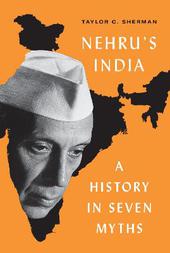
|
Nehru's India: A History in Seven Myths
Hardback
Main Details
| Title |
Nehru's India: A History in Seven Myths
|
| Authors and Contributors |
By (author) Taylor C. Sherman
|
| Physical Properties |
| Format:Hardback | | Pages:304 | | Dimensions(mm): Height 235,Width 156 |
|
| Category/Genre | Asian and Middle Eastern history |
|---|
| ISBN/Barcode |
9780691222585
|
| Classifications | Dewey:954.042092 |
|---|
| Audience | |
|---|
| Illustrations |
7 b/w illus.
|
|
Publishing Details |
| Publisher |
Princeton University Press
|
| Imprint |
Princeton University Press
|
| Publication Date |
11 October 2022 |
| Publication Country |
United States
|
Description
An iconoclastic history of the first two decades after independence in India Nehru's India brings a provocative but nuanced set of new interpretations to the history of early independent India. Drawing from her extensive research over the past two decades, Taylor Sherman reevaluates the role of Jawaharlal Nehru, India's first prime minister, in shaping the nation. She argues that the notion of Nehru as the architect of independent India, as well as the ideas, policies, and institutions most strongly associated with his premiership-nonalignment, secularism, socialism, democracy, the strong state, and high modernism-have lost their explanatory power. They have become myths. Sherman examines seminal projects from the time and also introduces readers to little-known personalities and fresh case studies, including India's continued engagement with overseas Indians, the importance of Buddhism in secular India, the transformations in industry and social life brought about by bicycles, a riotous and ultimately doomed attempt to prohibit the consumption of alcohol in Bombay, the early history of election campaign finance, and the first state-sponsored art exhibitions. The author also shines a light on underappreciated individuals, such as Apa Pant, the charismatic diplomat who influenced foreign policy from Kenya to Tibet, and Urmila Eulie Chowdhury, the rebellious architect who helped oversee the building of Chandigarh. Tracing and critiquing developments in this formative period in Indian history, Nehru's India offers a fresh and definitive exploration of the nation's early postcolonial era.
Author Biography
Taylor C. Sherman teaches in the Department of International History at the London School of Economics and Political Science. Her books include Muslim Belonging in Secular India and State Violence and Punishment in India.
Reviews"Nehru's India is a revisionist tour de force that shatters Nehruvian mythology. The framing device, "a history in seven myths", is an elegant contrivance: Sherman offers seven compressed surveys that controvert the catchphrases of the era. Its brevity conceals an ambitious book."---Pratinav Anil, Times Literary Supplement "Sherman has the natural flair of a storyteller. . . .a timely reappraisal of the early years of the state of India at a moment when Nehru's legacy is being fought over."---Kavita Puri, The Spectator "Refreshing. . . . This book makes a profound intervention by re-evaluating Nehru's allegedly contentious legacies, and his role as Prime Minister."---Shaikh Mujibur Rehman, Hindustan Times
|